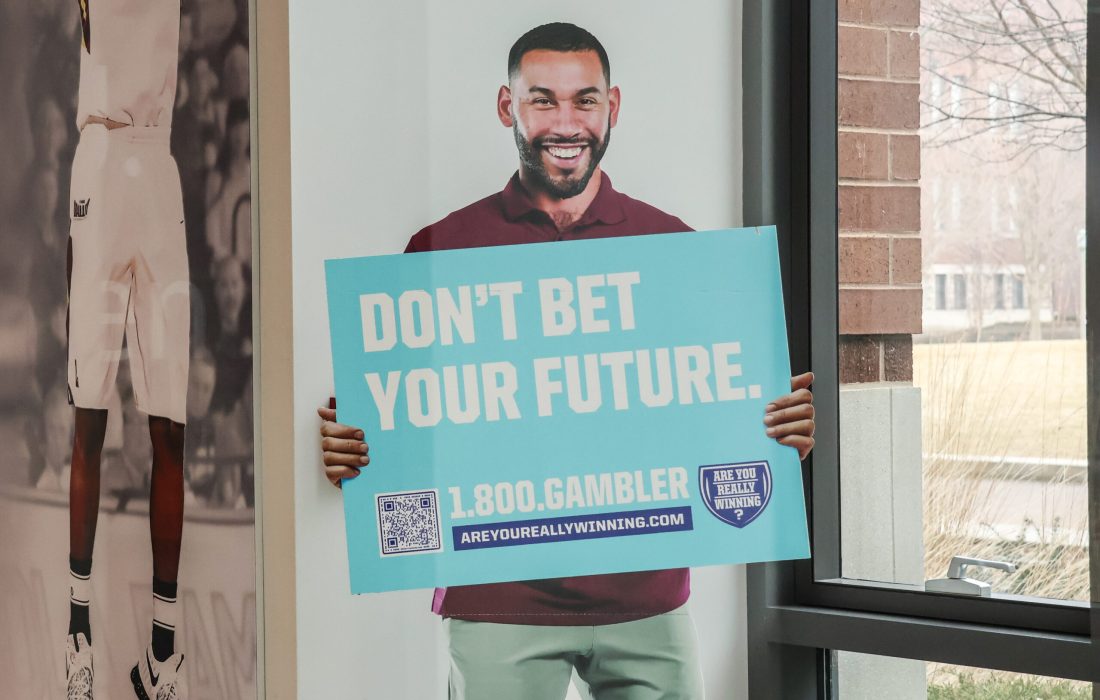Staff writer Ryan Maddigan sounds the alarm on the decidedly un-super sides of Super Bowl sports gambling.
To Enjoy This Year’s Super Bowl — Don’t Bet On It
The upcoming Super Bowl matchup between the Kansas City Chiefs and Philadelphia Eagles will mark not only the second matchup between these two teams in three years, but also the Chiefs’ third straight appearance in the titular game.
Given mixed public feelings regarding this familiar match up, the inclination to bet on the Super Bowl is natural — it makes things more interesting. Putting a stake in the game can make viewers more invested than they may’ve been without the wager, even for die-hard fans.
There’s little harm in placing small bets on games you would’ve watched anyway. But I challenge you to not place a bet on this year’s Super Bowl — not just to save money or avoid addiction, but because of how intertwined the gambling industry and professional sports leagues have become.
The proliferation of sports betting can be seen here in Chicago, even within the friendly confines of Wrigley Field.
As fans of the second oldest baseball stadium in the country with a rich history of preserving nostalgia, Cubs fans initially launched campaigns lambasting the installation of lights for night games in 1988.
But the same line drawn by fans regarding the installation of stadium lights was stomped over by the sports betting industry. In 2023, Draft King Sports Book at Wrigley Field — a restaurant and bar where customers can place bets from tablets — opened in June with almost no resistance from fans, despite flying in the face of baseball tradition.
Retired sports legends like Drew Brees, the Manning brothers and Charles Barkley are featured in ads for some of the largest online sportsbooks, along with a slew of current players, like Lebron James.
By appearing in these ads, players are directly altering the ways fans interact with the teams they support.
Though the front office of professional football, basketball and baseball teams have always classified the value of their players in a monetary sense, sports fans are beginning to do the same.
Rather than liking a player based on the hustle they bring to a team or their personality off the field, fans seem to be using the player’s sportsbook value as the key indicator of whether they’re worth rooting for or not.
The significance of James being in a Draft Kings advertisement transcends being a familiar face — it becomes an invitation for gamblers to bet on James himself.
The commissioners of both Major League Baseball and the National Basketball Association have cited concerns about dwindling enthusiasm for their respective leagues. Though some of this comes from a changing media apparatus making it difficult for young adults to watch certain games behind a streaming paywall, it’s also a result of fans seeing players as numbers instead of people.
Why would a person root for a team or player they constantly lose money on?
Individual teams have also started encouraging fans to place bets.
Since 2021, both the Chiefs and Eagles have partnered with online sports books — Bet MGM and Caesars Sportsbook, respectively. Teams are prioritizing fans’ hope of making money rather than delivering them a win.
Some fans, incentivized by special deals and promotions, may argue the only bets they place are for the team they already root for. However, unless these fans place bets for their team to win every game of the year, gambling ads imply fans are betting on their team to lose.
Considering the sports gambling industry made $11 billion in revenue in 2024 and the average bettor ends the year with a negative balance, alongside the lack of regulations around the industry — like the ones placed on other addictive products like tobacco — not placing a bet on this Super Bowl is probably the best thing you can do to truly enjoy it.
Humans have loved live sporting events for hundreds of years. We’ve always been drawn to the human triumph in every touchdown pass, buzzer-beating 3-pointer and stolen base. Let’s not ruin sports by replacing real-life drama with cold-hard odds and calculations.
-

Ryan is a fourth-year student majoring in history with a minor in global studies. He enjoys writing satire and opinions about societal movements. Originally from Los Angeles, Maddigan's time as an intern for the 44th Ward — alongside his experience in Loyola's Writing Center — makes him accustomed to the Loyola and Chicago cultures. For fun he likes to hangout with his siblings and build Legos.
View all posts
Topics
Get the Loyola Phoenix newsletter straight to your inbox!


